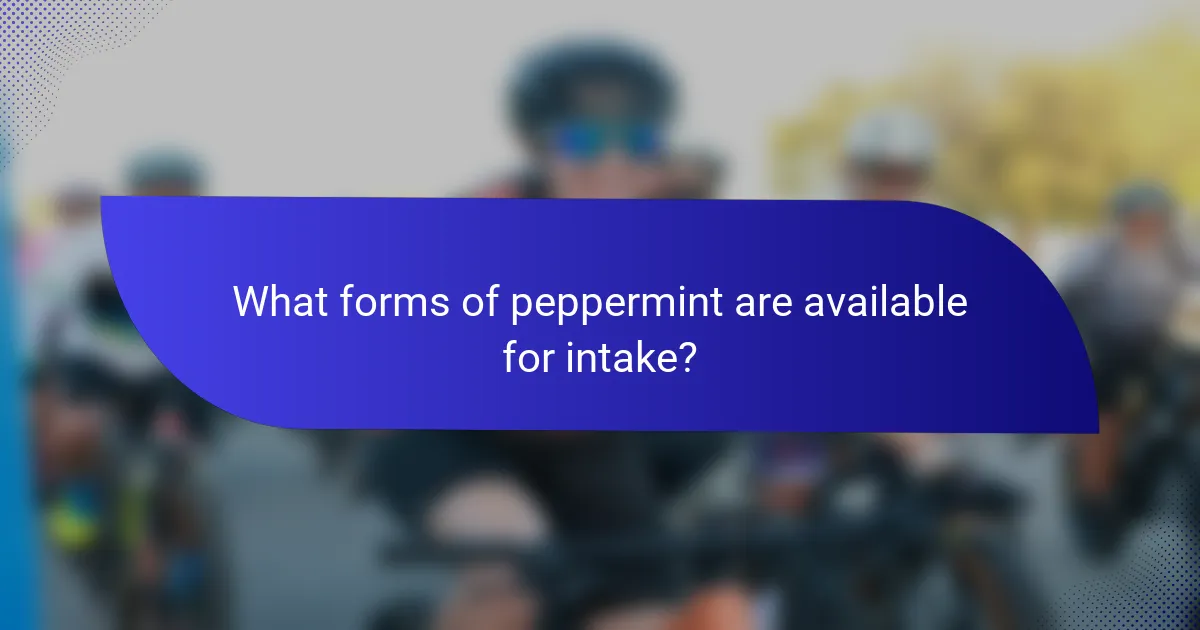Peppermint provides significant therapeutic benefits, including relief from digestive issues and headaches. This article explores its various forms of intake, such as tea and essential oil, along with important safety guidelines for effective use. Discover how peppermint can enhance your well-being while minimizing risks associated with its consumption.

What are the therapeutic benefits of peppermint?
Peppermint offers various therapeutic benefits, including relief from digestive issues, headaches, and respiratory problems. Its active compounds, like menthol, provide analgesic and anti-inflammatory effects. Peppermint can be consumed as tea, essential oil, or capsules. Safety guidelines recommend dilution for topical use and moderation in consumption.
How does peppermint aid in digestive health?
Peppermint aids digestive health by relaxing the muscles of the gastrointestinal tract, which alleviates symptoms like bloating and gas. Its active component, menthol, enhances bile flow, promoting better digestion. Additionally, peppermint has antimicrobial properties that can help balance gut flora. Studies show that peppermint oil capsules can significantly reduce symptoms of irritable bowel syndrome (IBS).
What role does peppermint play in pain relief?
Peppermint plays a significant role in pain relief due to its natural analgesic properties. It contains menthol, which provides a cooling sensation and may help alleviate headaches, muscle pain, and joint discomfort. Research indicates that applying peppermint oil topically can reduce tension headaches effectively. Additionally, peppermint tea can soothe digestive discomfort, contributing to overall pain relief.
Why is peppermint used for respiratory issues?
Peppermint is used for respiratory issues due to its menthol content, which acts as a natural decongestant. It helps to relieve symptoms of congestion and promotes easier breathing. Additionally, peppermint has anti-inflammatory properties that can soothe irritated airways. Inhalation of peppermint oil can provide immediate relief, making it a popular choice for respiratory discomfort.
How can peppermint improve mental clarity and focus?
Peppermint can enhance mental clarity and focus through its invigorating aroma and active compounds. The menthol in peppermint stimulates the brain, promoting alertness and cognitive function. Inhaling peppermint essential oil or consuming peppermint tea can yield these benefits. Studies indicate that peppermint may improve memory and reduce fatigue, making it a valuable tool for mental performance.

What forms of peppermint are available for intake?
Peppermint is available for intake in several forms, including fresh leaves, dried leaves, essential oil, tea, capsules, and tinctures. Each form offers unique benefits and methods of consumption. Fresh peppermint leaves are often used in culinary dishes, while dried leaves are suitable for teas. Essential oil provides concentrated therapeutic effects, and capsules offer a convenient option for supplementation. Tinctures allow for easy dosage adjustment.
Which types of peppermint essential oils are most effective?
Peppermint essential oils vary in effectiveness based on their extraction methods and chemical compositions. The most effective types include steam-distilled peppermint oil, which retains high menthol content, and organic peppermint oil, known for its purity and potency. Both types offer significant therapeutic benefits, such as relieving headaches and improving digestion. Additionally, peppermint oil from specific regions, like the Pacific Northwest, often has unique attributes that enhance its efficacy.
How do peppermint teas compare to other forms?
Peppermint teas provide unique therapeutic benefits compared to other forms like capsules or essential oils. Peppermint tea is known for its soothing effects on digestion and its ability to relieve headaches. In contrast, peppermint capsules may offer concentrated doses of menthol, while essential oils require careful dilution for topical use. Each form has distinct safety guidelines; for example, excessive peppermint tea can lead to heartburn, while essential oils can cause skin irritation if not properly diluted.
What are the benefits of peppermint capsules and supplements?
Peppermint capsules and supplements offer various health benefits, including digestive support, relief from headaches, and improved respiratory function. They contain menthol, which can soothe gastrointestinal issues and reduce nausea. Additionally, peppermint may enhance cognitive performance and provide antimicrobial properties. Safety guidelines suggest consulting with a healthcare provider before use, especially for pregnant or breastfeeding individuals.

What safety guidelines should be followed when using peppermint?
When using peppermint, follow safety guidelines to avoid adverse effects. Limit intake to recommended doses, especially for essential oils, which can be potent. Pregnant or breastfeeding individuals should consult a healthcare provider before use. Conduct a patch test for topical applications to prevent skin irritation. Avoid ingestion of essential oils without professional guidance, as they can cause gastrointestinal issues.
Are there any side effects associated with peppermint use?
Peppermint may cause mild side effects, including heartburn, allergic reactions, and digestive issues. These effects are uncommon but can occur, particularly with excessive use. Individuals with gastroesophageal reflux disease (GERD) should be cautious as peppermint can exacerbate symptoms.
How should peppermint be stored for maximum efficacy?
Store peppermint in a cool, dark place in an airtight container to maintain its efficacy. Proper storage prevents the loss of essential oils and flavor. For dried peppermint, ensure it is kept away from moisture to avoid mold. Fresh peppermint should be refrigerated, ideally in a damp paper towel within a plastic bag. This method can extend its freshness for up to two weeks.
Which populations should avoid peppermint products?
Individuals with gastroesophageal reflux disease (GERD), those allergic to peppermint, and pregnant or breastfeeding women should avoid peppermint products. Peppermint can exacerbate GERD symptoms by relaxing the lower esophageal sphincter. Allergic reactions may occur in sensitive individuals, leading to skin irritation or respiratory issues. Pregnant and breastfeeding women may experience adverse effects, so caution is advised. Always consult a healthcare professional before using peppermint products, especially if you have underlying health conditions.

What unique applications of peppermint are gaining popularity?
Unique applications of peppermint include its use in aromatherapy, digestive health supplements, and natural pest repellents. These innovative uses are gaining popularity due to peppermint’s therapeutic benefits and versatility. For instance, peppermint oil is increasingly used in essential oil blends for stress relief and improved mental clarity. Additionally, its efficacy in alleviating digestive discomfort has led to the rise of peppermint-infused teas and capsules. Furthermore, peppermint’s natural insect-repelling properties make it a favored ingredient in eco-friendly pest control products.
How is peppermint being used in aromatherapy?
Peppermint is widely used in aromatherapy for its invigorating scent and therapeutic benefits. It promotes mental clarity, reduces stress, and alleviates headaches. Inhalation of peppermint essential oil can enhance focus and energy levels. Additionally, it may help relieve respiratory issues and improve digestion when used in diffusers or massage oils.
What innovative culinary uses of peppermint are trending?
Innovative culinary uses of peppermint include its incorporation into beverages, desserts, and savory dishes. Peppermint-infused cocktails and teas are gaining popularity for their refreshing flavor. Desserts like peppermint chocolate mousse and peppermint ice cream offer unique tastes. Additionally, chefs are experimenting with peppermint in savory dishes, such as salads and sauces, to add a fresh twist. This herb’s versatility makes it a trending ingredient in modern cuisine.

What are common mistakes when using peppermint?
Common mistakes when using peppermint include overconsumption, which can lead to digestive issues, and using essential oil without dilution, risking skin irritation. Additionally, neglecting to consult with a healthcare provider before use may cause adverse effects, especially for individuals with specific health conditions. Proper dosage and forms of intake, such as tea or capsules, can enhance therapeutic benefits while minimizing risks.
How can improper dosage affect peppermint’s benefits?
Improper dosage can diminish peppermint’s therapeutic benefits and lead to adverse effects. Excessive intake may cause gastrointestinal discomfort, heartburn, or allergic reactions. Conversely, insufficient dosage may fail to provide the desired relief from symptoms such as headaches or digestive issues. The recommended dosage varies based on form, such as oil or tea, emphasizing the importance of adhering to safety guidelines for optimal effects.
What should users be cautious about in peppermint products?
Users should be cautious about potential allergic reactions and dosage when using peppermint products. Peppermint can cause skin irritation in some individuals. Overconsumption may lead to gastrointestinal issues such as heartburn or nausea. Pregnant or breastfeeding women should consult a healthcare professional before use, as safety during these periods is not fully established. Additionally, peppermint oil should not be ingested in large amounts due to its potency.
How to choose high-quality peppermint products?
To choose high-quality peppermint products, look for organic certification, high menthol content, and clear labeling of extraction methods. Check for third-party testing to ensure purity and potency. Consider the form of intake that suits your needs, such as essential oils, teas, or capsules. Quality peppermint products should have a strong aroma and flavor, indicating freshness.